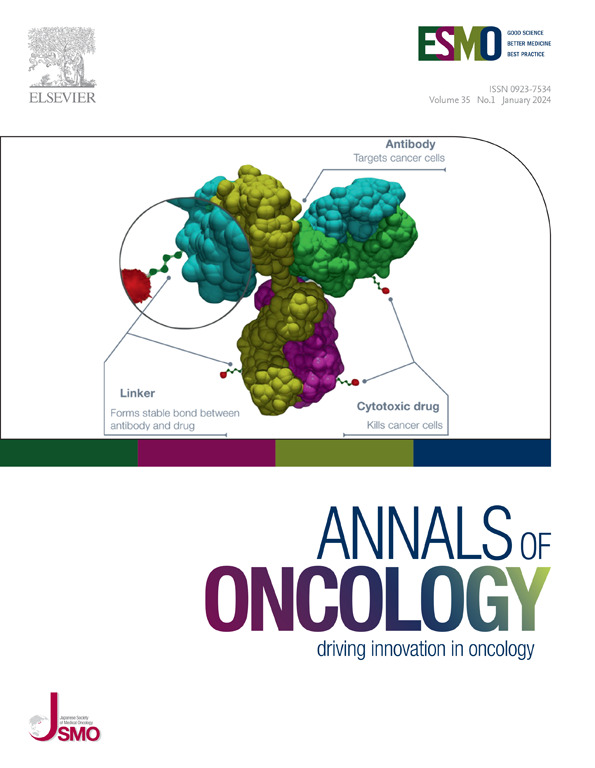托西珠单抗在治疗免疫检查点抑制剂相关关节炎和预防 ICI 再挑战期间复发方面具有双重优势:TAPIR 研究。
IF 56.7
1区 医学
Q1 ONCOLOGY
引用次数: 0
摘要
研究背景这项回顾性研究旨在评估托西珠单抗(TCZ)在治疗ICI相关关节炎(ICI-AR)和预防再次复发方面的双重疗效:我们确定了26名ICI-AR患者。主要目的是评估 TCZ 在 ICI-AR 治疗中的疗效,以及其中 11 名患者在 ICI 再挑战期间作为二级预防药物的疗效。患者接受泼尼松(CS)治疗,剂量为 0.3 毫克/千克,每周减量 0.05 毫克/千克,为期六周。TCZ 的剂量为 8 mg/kg Q2w。在接受二次预防的亚组(再挑战 n=11)中,在 ICI 再挑战的同时,以相同的方案重新引入 TCZ,但不添加 CS。对照组患者(再挑战 n=5)在不使用 TCZ 的情况下进行再挑战。次要终点包括ICI再挑战后的持续时间评估、重新引入CS > 0.1 mg/kg/天、ICI-RA复发和DCR:患者的中位年龄为 70 岁。结果:患者的中位年龄为 70 岁,从开始接受 ICI 治疗起的中位随访时间为 864 天。在使用 TCZ 治疗 ICI-AR 的 20 名患者中,所有患者(100%)在 10 周后均达到 ACR70 反应率,即病情改善超过 70%。其中 81% 的患者在接受 TCZ 治疗 24 周后实现了无类固醇缓解。再障患者的中位随访期为 552 天。研究结果表明,与未接受预防性治疗的患者相比,接受TCZ预防性治疗的患者在ICI-AR再次复发时的复发率有所下降(17% vs 40%)。预防性治疗完全消除了对 CS 的需求(0% 对 20%),ICI 治疗的平均持续时间明显从 113 天延长到 206 天。复查后12个月的结果显示,疾病控制率(DCR)为77%。在TCZ预防期间,CXCL9仍然升高,与ICI-AR开始时的水平相比没有下降:除治疗 ICI-AR 外,TCZ 还可作为辅助预防药物,防止 ICI 再挑战后出现复发症状并延长 ICI 治疗时间。本文章由计算机程序翻译,如有差异,请以英文原文为准。
Tocilizumab provides dual benefits in treating immune checkpoint inhibitor-associated arthritis and preventing relapse during ICI rechallenge: the TAPIR study
Background
The aim of this retrospective study was to evaluate the dual efficacy of tocilizumab (TCZ) in the treatment of immune checkpoint inhibitor (ICI)-associated arthritis (ICI-AR) and the prevention of relapses after rechallenge.
Patients and methods
We identified 26 patients with ICI-AR. The primary objectives were to evaluate TCZ efficacy in ICI-AR treatment and as secondary prophylaxis during ICI rechallenge in 11 of them. Patients received prednisone (CS) at 0.3 mg/kg tapered at 0.05 mg/kg weekly for six weeks. TCZ was administered at a dose of 8 mg/kg every 2 weeks. In the subgroup receiving secondary prophylaxis (rechallenge n = 11), TCZ was reintroduced with the same regimen concurrently with ICI rechallenge, and without the addition of CS. A control group of patients (rechallenge n = 5) was rechallenged without TCZ. Secondary endpoints included post-rechallenge evaluation of ICI duration, reintroduction of CS >0.1 mg/kg/day, ICI-AR flares, and disease control rate.
Results
The median age of the patients was 70 years. The median follow-up from ICI initiation was 864 days. Among the 20 patients treated with TCZ for ICI-AR, all (100%) achieved an ACR70 response rate, defined as greater than 70% improvement, at 10 weeks. Some 81% of these patients achieved steroid-free remission after 24 weeks on TCZ. The median follow-up period was 552 days in rechallenged patients. The results demonstrated a reduction in ICI-AR relapses upon ICI rechallenge in patients receiving TCZ prophylaxis compared with patients who did not receive prophylaxis (17% versus 40%). The requirement for CS was completely abolished with prophylaxis (0% versus 20%), and the mean duration of ICI treatment was notably extended from 113 to 206 days. The 12-month post-rechallenge outcomes showed a disease control rate of 77%. During TCZ prophylaxis, CXCL9 remained elevated, showing no decline from their concentrations at the onset of ICI-AR.
Conclusions
In addition to treating ICI-AR, TCZ demonstrated efficacy as a secondary prophylactic agent, preventing the recurrence of symptoms and lengthening ICI treatment duration after ICI rechallenge.
求助全文
通过发布文献求助,成功后即可免费获取论文全文。
去求助
来源期刊

Annals of Oncology
医学-肿瘤学
CiteScore
63.90
自引率
1.00%
发文量
3712
审稿时长
2-3 weeks
期刊介绍:
Annals of Oncology, the official journal of the European Society for Medical Oncology and the Japanese Society of Medical Oncology, offers rapid and efficient peer-reviewed publications on innovative cancer treatments and translational research in oncology and precision medicine.
The journal primarily focuses on areas such as systemic anticancer therapy, with a specific emphasis on molecular targeted agents and new immune therapies. We also welcome randomized trials, including negative results, as well as top-level guidelines. Additionally, we encourage submissions in emerging fields that are crucial to personalized medicine, such as molecular pathology, bioinformatics, modern statistics, and biotechnologies. Manuscripts related to radiotherapy, surgery, and pediatrics will be considered if they demonstrate a clear interaction with any of the aforementioned fields or if they present groundbreaking findings.
Our international editorial board comprises renowned experts who are leaders in their respective fields. Through Annals of Oncology, we strive to provide the most effective communication on the dynamic and ever-evolving global oncology landscape.
 求助内容:
求助内容: 应助结果提醒方式:
应助结果提醒方式:


